‘I’m going somewhere that could have a nuke dropped on it’: Why Bryce Wilson will stay in Ukraine
Victorian photographer Bryce Wilson is at the frontline of the war in Ukraine, with just a knife to protect himself. He says it’s his duty to record the bloodshed, even if it gets him killed.
News
Don't miss out on the headlines from News. Followed categories will be added to My News.
Victorian photographer and filmmaker Bryce Wilson was the first Australian journalist to embed with the Ukrainian army and Ukrainian special forces during combat deployments. The country boy from Yea knows he could be killed in Ukraine at any time, but says the risk is one he must take because he has an obligation to democracy and world peace, “to be the witness to history and to report and tell the truth”.
In the midst of war, all he has to protect himself is a knife.
“I am going to go somewhere that could possibly have a nuke dropped on it and end my life instantly . . . it’s like Putin has lost control, he’s unhinged,” Wilson said.
“If Ukraine is allowed to be destroyed, it’s a serious risk to the concept of democracy around the world. Ukrainian people are fighting for stability for the whole world.”
This is Bryce Wilon’s extraordinary interview.
HM: You’re a country boy from Victoria?
BW: I grew up in Yea.
HM: How did you end up in Ukraine?
BW: In 2013 I was working professional jobs in the city, in Melbourne, but the situation in Ukraine was in the news a lot. The war had started, but also, MH17 was shot down and there were Australians on board. I was interested in photography, and I was unfulfilled with a lot of things in my life. My job was made redundant. I received a redundancy payout, and I was thinking, “what do I want to do with my life?” I wanted to do photojournalism, and I’d also been researching the conflict in Ukraine. I saw there was still fighting occurring in the east, but it was critically under reported, especially by Australian media. A bit naively, I thought I could head over. I contacted the ministries of Information and Defence, to see if foreign journalists could embed with the military. They wrote back: ‘Yes, fill out these forms, come over here and we will sort it out.’
HM: Seems an easy process?
BW: Very easy. I came over and did an embedded journalism stint with the 93rd Mechanised Brigade, and it was in a place called Pisky. It’s a destroyed town now, very close to Donetsk Airport, which was the scene of some of the most intense fighting. I did that, and while I was there, a guy my age was killed. I formed a close bond with some of those people. It served as the catalyst to keep going back over the years. I haven’t lived here continuously, I would come here for three months, go home for a bit, and come back. I have been travelling back and forth between Australia and Ukraine ever since.
I am going to Kyiv. I - nobody - will be safe there.
(I will be) the press officer for the 93rd Brigade, where I went in 2015, which is now fighting in Kyiv with one of the territorial defence units. I’m going back there with them to do embedded journalism – to see what’s happening and report the truth to the world. It’s going to be very dangerous.
To see it, and report on it, you need to be there. There is a balance between pushing too much and putting yourself in harm’s way, but you need to be on the ground. Hopefully, I can get in, and then out, before it’s too late.
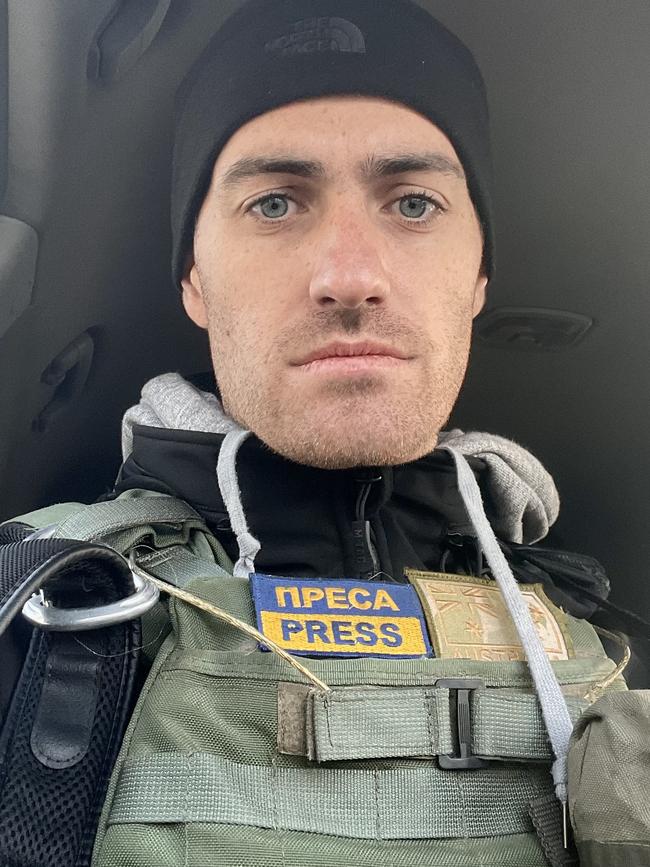
HM: That’s quite a sentence … “hopefully I can get out … before it’s too late”.
BW: It does sound odd when I say it.
HM: But it’s a risk you are willing to take to help tell the world what is happening?
BW: It is. I came here this time to make a documentary project about the state of the conflict in Donbas and the humanitarian crisis. In the east of Ukraine, there has been a war there for seven-and-a-half years. I have been focused on that primarily, the humanitarian situation and the evolution of the conflict. I came here to make this documentary, and the potential for an invasion would be a background threat. Now, it has become much more proactive. Over the last three-and-a-half weeks, I have so much footage, interviews with people saying that the war wasn’t going to happen. Footage from the frontline where I was interviewing civilians, footage of my two Danish colleagues who ended up being shot a few days ago at the Russian border.
HM: Killed?
BW: No. Emil Filtenborg took rounds through his leg, and Stefan Weichert was shot through the shoulder. I had worked with those guys very closely for six days straight. We were out there on the frontline together every day. It’s surreal.
HM: Terrifying. You are well versed on this – I am grappling with a clear answer – but explain to me, what this war is actually about?
BW: It’s not a silly question. In my opinion, and remember I’m not in geopolitics, but it’s solely about Russia trying to control an independent nation. That’s it.
HM: Russia, or Putin?
BW: Good point. Throughout the entirety of the history of Ukraine, the Russian government, in many shapes and forms, has attempted to destroy and cease to exist Ukrainian culture and identity. You should research an event called The Holodomor, which was a forced famine here which killed millions of people. Stalin intentionally starved people in Ukraine; they would go and raid houses for food. The Ukrainian language was oppressed, in many ways – speaking Ukrainian was seen as being appropriate for people in villages, not sophisticated cities. I understand Putin’s measure is that Ukraine is forming relationships with NATO, but at the end of the day, an independent nation has the right to choose its own path and journey. That’s all irrelevant. Putin doesn’t like the fact that Ukraine is an independent nation next to Russia.
HM: How does the world allow a ‘peacekeeping mission’ that sees the murdering of innocent civilians because someone doesn’t like Ukraine’s independence?
BW: I honestly don’t know. It’s crazy to me. Yesterday they fired rockets, a barrage from a multiple launch rocket system called MLRS, into civilian areas, intentionally, to scare the people here. In my opinion, these are war crimes, equivalent to the genocidal actions that Hitler engaged in. I’m not trying to compare them in scope, but objectively, what is happening is incredibly traumatic. They’re killing civilians, launching missiles at apartment buildings, they are using thermobaric bombs, which, when they explode, collapse your lungs. They are banned under the Geneva Conventions, and they used those yesterday. What is going on here now is abhorrent.
Putin has lost control, he’s unhinged . . . he’s lost the plot
HM: Yet it all continues … I am so naive to it all, but I don’t understand two things. Firstly, how it has been initiated from Russia’s end, and secondly, how we have watched it happen, knowing it was coming, without being able to stop it.
BW: If you are looking for rationale and logic with all of this, you’ll be frustrated. I don’t get it either. Even with Putin saying to prepare our nuclear task force, that is just plain crazy. So, having verbalised it,I am going to go somewhere that could possibly have a nuke dropped on it and end my life instantly. I don’t know why they are not doing more. It’s like Putin has lost control, he’s unhinged.
HM: Emotionally and pragmatically?
BW: Both, definitely. As we would say in Australia, he’s off the rails. He has lost the plot.
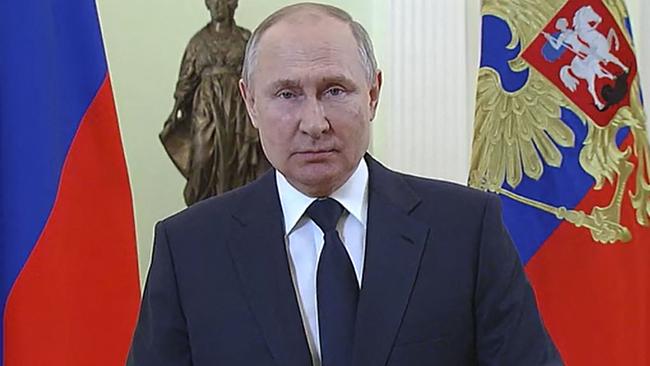
HM: A lot of people see it like that, and I guess that is what I find staggering. He hasn’t been stopped.
BW: I read an anecdote that he is now hiding in the mountains, and only letting a very select number of people come to see him. Adolf Hitler did that at the end of WWII. He’s scared that even people close to him will try to kill him, cease power, or initiate a coup. People are protesting in Russia now – their economy is being ruined. Saddam Hussein did the same. These dictator type characters went and hid, and didn’t let people see them, because they knew they’d messed up. They know when they are doing this that their days are numbered.
HM: Do you believe Putin is in hiding?
BW: Typically, when characters such as him, Saddam, Adolf Hitler, do that, it’s towards the end of their reign. They know that they can’t hold power anymore, they know that they’re done. That’s the feeling I have. I don’t know why more has not been done to stop this. I don’t get it. It’s crazy.
HM: Tell me about the people of Ukraine. What is their overriding sense of reality right now? Fear and terror? Hopelessness? Is it variable dependant on where you are?
BW: I was (recently) sitting down having dinner with a close friend of mine last night, and she was telling me that the last days have felt like a lifetime to her. She was telling me before I went to Donbas that that world, as she knew it, feels so far away now. Life is completely different. She said, ‘I feel like I live in a different world’. She was saying it’s like a night and day difference. ‘Will I ever have a job again? What does my life look like now?’
HM: Is she, are people, fearful for their life?
BW: She wants to go back to Kyiv. She said: ‘This is my home. Why should I have to leave?’ Even her mum wants to go back there, volunteer and help people. A lot of people realise the risk to their personal safety, and in a way, that’s part of the reason that I feel compelled and obliged to keep informing people about what is happening. I don’t know anyone that is on the ground, on the streets, from Australia. This is the battle for democracy. If Ukraine is allowed to be destroyed, it’s a serious risk to the concept of democracy around the world. Ukrainian people are fighting for stability for the whole world. They are the shield for all of Europe, and the West. They are dealing with the bulk of everything. If people like my friend can be brave, guys in the streets trying to protect the city, children, women, men, can be brave, I can do it as well. In the east, I met some people who were very pro-Russian. They said the USSR was a great time for them, they lived better. There are mixed sentiments, but I’m telling you, 99 per cent of people I speak with don’t want this war. They don’t want Putin here, they don’t want the Russian military here, they want independence for their country. They value and love their Ukrainian identity.
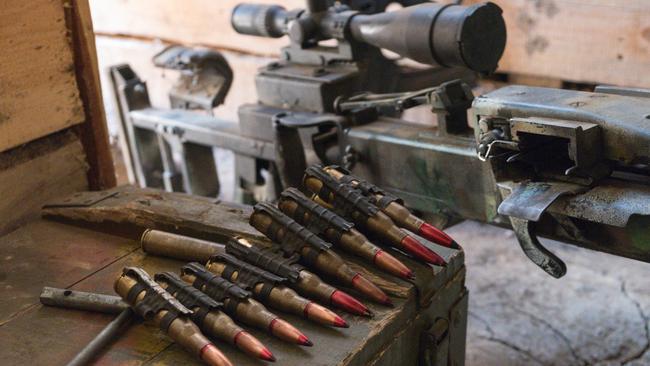
HM: You articulated the fight for democracy so well. If this is allowed to happen, as you say, democracy as we know it is severely dented.
BW: And I know America, and Australia, they’ve gone and fought in Afghanistan, been involved in Vietnam, but when was the last time a western country actively invaded another independent country, because they didn’t like their political policy, or simply because they were a neighbour? How is this allowed to happen? There is warfare on the streets of a major European city right now. There is street-to-street fighting, and the Russian Federation is launching massive missile bombs into civilian areas. That’s not on.
HM: Explain the combat on the streets. Are we talking about those terrible scenes you see in Saving Private Ryan where people are literally shooting a man to his death with a rifle that they have been given?
BW: That will be happening. Can you imagine? There have been several battles in the outskirts. Russian armour has been massively destroyed by the antitank weapons that the coalition partners supply. There has been street-to-street fighting in some towns. A lot of Russian prisoners have been taken; nearly 6000 Russian soldiers have nearly been killed as per the Ministry of Defence. The fighting has been brutal. The Russian soldiers are young blokes, from what I’ve seen, on average, 20 years old.
I could die unceremoniously at any point
HM: So young …
BW: They were allegedly told they were going there on exercises, they didn’t even realise they were invading. There are mass artillery bombardments. When the invasion started, I was in a city in the east called Kramatorsk, and I’d just picked up my Aussie mate, Matt. I was trying to bring him to the border to get out of the country. As we were walking back to my apartment, a guided missile flew 50m above my head and smashed into an airport 600m from where I was. This mix of WWII, brutal street-to-street fighting, with the cutting-edge technology of contemporary warfare. You could die unceremoniously at any point.
HM: You’re scared for your own life, I assume, but feeling a sense of duty.
BW: I’d be crazy if I wasn’t scared. I have an obligation, whether it’s for one week, two weeks, the whole time that this is going on, to be there while it’s happening, to be the witness to history, and to report and tell the truth.I have a platform to share with people the reality that is going on. Even talking to you now, if something happens to me, we have had this time, I hope that you can pass this message forward, and people will understand what is really going on here. I am afraid . . . but I need to put that aside, because I have more important things to do than be crippled by fear.
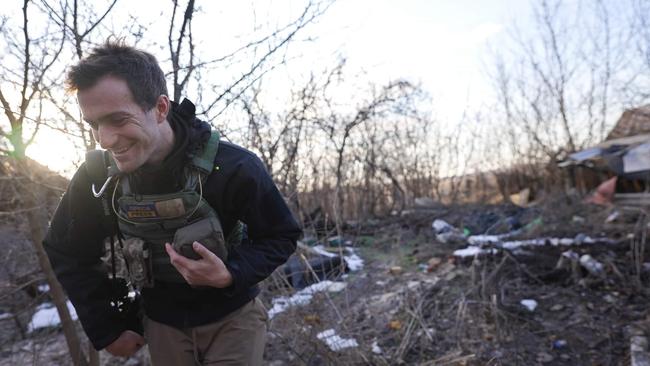
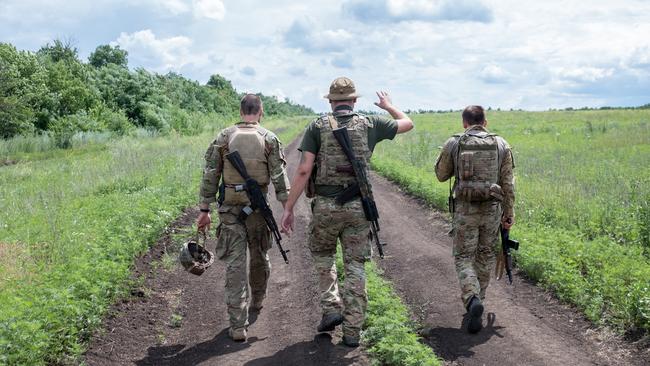
HM: I have been reading that the Russians are allegedly creating “fake Ukrainians” online, with AI-designed faces, of people that are spreading hatred from within. It’s like something out of a movie.
BW: I’ve seen it with the Ukrainians too. They are putting a lot of content on Instagram, on Twitter, to show a demoralised Russian military. My gut feeling is that is the case, because they have lost the momentum. It’s World War II-era brutal street fighting, combined with cutting-edge psychological warfare. Nothing like this has ever happened before, and what we are seeing now is the employment of the last 10, 20, 30, 40 years of research, being implemented at a nationwide invasion-level scale.
HM: When was the first time you heard gunfire, a missile?
BW: About 10 seconds after Putin declared war. The apartment I was living in was very close to this military air base. I was watching his speech on my phone, in bed, at 4.30am. From memory, I am confident that in a very short amount of time, from Putin saying there was going to be a military operation in Ukraine, there were explosions outside my apartment. I knew straight away they weren’t waiting until tomorrow, they were doing this now. That’s when I got out of bed, got dressed, and started going to work. Within minutes of the war being declared, there were already missiles landing in Ukraine.
HM: You said a lot of Ukrainians were thinking this wouldn’t happen, there was no way he would launch an attack. What was the thinking there?
BW: I have no idea.
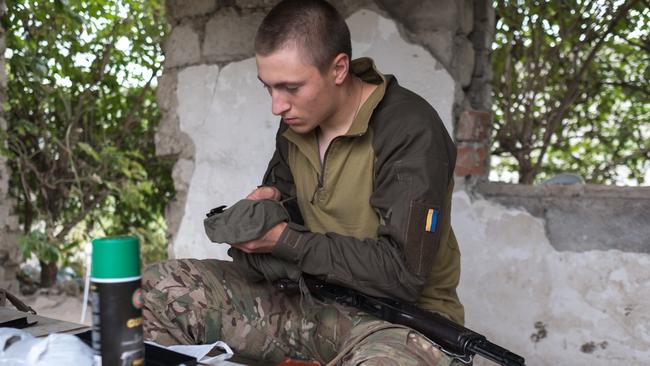
HM: Were you sure they would?
BW: What I was saying was that based on what was happening, the concept of a large-scale invasion seemed crazy, but what I could imagine was a significant escalation in the Donbas region. In my opinion, people here are just fatigued after seven years of war. They don’t take the risk seriously. It was perplexing, because even on the morning of the invasion, when bombs were landing in Kramatorsk, I was talking with a woman, and she was casually walking to work. I was interviewing her, saying, ‘aren’t you scared?’ She said, ‘no, I’m just going to do my job’. In the middle of war, people were casually strolling around, chatting with friends. I did see panic, but people had only started to make plans to leave when the war started.
HM: What about Volodymyr Zelenskyy? He is, seemingly, doing an extraordinary job. What is your view, and what is the view of Zelenskyy among Ukrainian people?
BW: The perception of Zelenskyy before the war is that he was respected, but he was somewhat like Donald Trump in that he came into power with no political experience. He was just a dude. At first, a lot of people thought he was weak on Russia, because he was trying to navigate towards peace in Donbas, and because of the situation in Crimea. Now, his approval rating is 90 per cent. Ukrainians are rallying behind him. There is this famous quote where the Americans offered him a ride out of there. His response: ‘I need ammunition, not a ride’. I said to one of my colleagues, it reminds me of when the kings would go out to the battlefield with their militaries and fight. It would be crippling for morale if he went down, but I also think if he was taken out, it would unite the people even more. They would fight until the last person. The average Ukrainian person now really looks up to him. I was watching his speech with my friend last night, and I could tell it was quite moving for her. She was impacted by it. As far as leaders go, I think he is doing a great job.
HM: I read this on social media: ‘This is president Zelenskyy. He is Jewish. His grandfather fought Nazis in WWII, many of his relatives were killed in the holocaust, he is standing up to a dictator because he is brave. Because he knows what happens if you don’t’. It says a lot.
BW: And on that topic, western media have failed Ukraine, because many journalists come here and misrepresent the concepts of Ukrainian nationalism, and project this idea that there are huge groups of neo-Nazis within Ukraine. I am telling you, it’s not true. That same reporting is used as a justification to launch this war operation. People here know the realities of Nazism, they know the realities of the holocaust. Zelenskyy summed it up very well. It’s a complete joke.
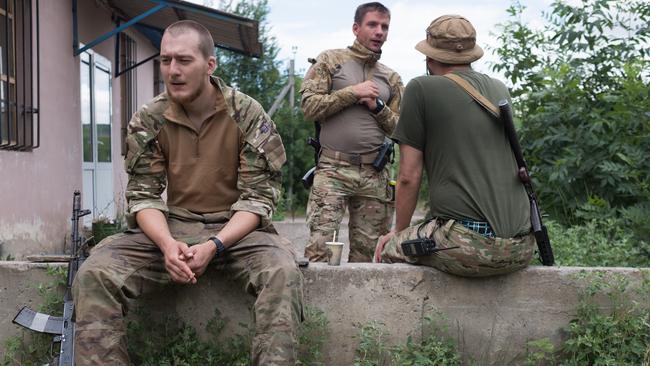
HM: What do you think of the severe costs and sanctions on Russia, in terms of what the world is doing? Is it going to be a significant enough impediment, or will Russia stop at any point?
BW: I don’t know the cost benefit of sanctions and how they affect nations. Russia has essentially been cut off from the world. Its economy has collapsed, the rouble is worth a cent. I don’t know how this will go, but I can see them thinking, we’ve committed now, we might as well go balls to the wall and get the job done. Or, it can be so crippling that the people in Russia have some sort of a revolution. I’m not too sure how it will come out in the wash.
My biggest fear is nukes . . . I carry a knife
HM: How do you think it ends?
BW: I don’t know. My biggest fear is nukes. I don’t think it will happen, but that’s a scary contemplation. I can see that the country gets cut in half, and the east of Ukraine is occupied by Russia.
HM: Against its will.
BW: Yes. I don’t know what will happen overall. Maybe there will be more peace talks, but I don’t want this to end in a total annihilation. The cost will be so extreme if cities need to be rebuilt.
HM: It feels like this has years to run.
BW: You reckon?
HM: Nothing ends quickly. You look at Afghanistan, Vietnam … all go for years, and the ramifications are decades or longer. It’s not Friday night football where in two hours you’ve got a result.
BW: It’s such a good way to describe it.
HM: This is a battle that doesn’t have a clock. A disaster, for so many, for so long, on both sides. Russians will die being sent into battle, Ukrainians will be killed fighting for their territory, and we are in 2022. Have we not learnt?
BW: I don’t think people have learnt, mate. I was in a restaurant in Kramatorsk, and I nearly started punching on with other media there because they were all sitting around, speculating, laughing, and talking about conspiracy theories. Like it was a game for their entertainment. The reality is dead children, an elderly woman with both her legs blown off on the street, bleeding out, it’s homes destroyed. It’s chaos. It’s real life, it’s traumatic, it’s sad.
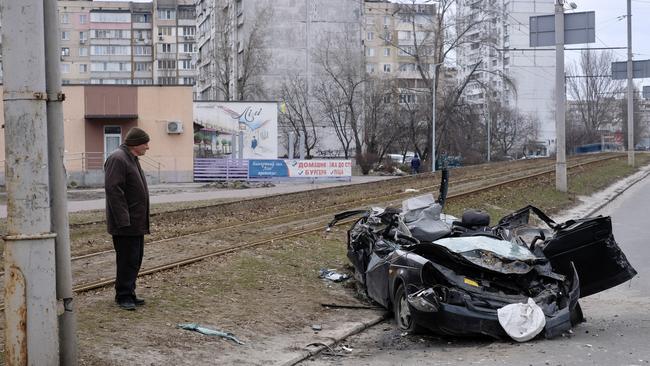
HM: I sit here speaking to you in the safety and sanctity of Melbourne. You are there, seeing it. People’s lives taken, children murdered, their legs blown off. And it’s happening tomorrow and the next day and the day after that.
BW: I am not morale-tired of being here, but even for one hour, I wish I could go sit in Brunswick and have a coffee, without fear through my body. That would be nice.
HM: Do you carry a gun?
BW: I can’t legally carry a weapon as media. I carry a knife.
HM: Is it true that civilians are preparing Molotov cocktails just to defend themselves?
BW: One hundred per cent. I saw a video last night of people in a civilian car, with Molotov cocktails in their car, on fire, driving past Russian vehicles and throwing them out the window. People have destroyed vehicles with Molotov cocktails here.
HM: I am just reading there is a Russian military convoy on the outskirts of Ukraine’s capital that extends more than 65km long, and covers the entire road from near Antonov Airport, outside Kyiv, to Prybirsk.
BW: I’ve seen this, but parts of the column are spread out. I don’t know what’s going on there, but it’s concerning. Everything is terrifying.
Stop, before this becomes World War III
HM: How are your parents with you being there?
BW: I was raised in foster care. My biological father died last year, and I don’t have a close relationship with my biological mother. My foster parents are worried for me, my family has reached out, but since I was 17, I have been on my own. I’m on my own now, and it’s scary.
HM: If you could say something to Putin, not that he would listen, what would you say?
BW: Stop before this ends the whole world. Is this going to involve other European countries? Is America going to get involved? Stop before this becomes World War III. You should not have invaded in the first place, there is no justification for this, people don’t buy it. You are losing power and control, the economy is destroyed, events will ripple through generations, decades of Russian lives changed, Ukrainian lives will be changed. It’s enough. Stop.


